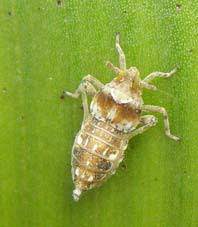Hartbeespoort, South Africa - Scientists and community members have found a unique way to deal with the invasion of water hyacinth invasion – a water hyacinth hyacinth-eating bug.
The Hartbeespoort dam in South Africa, once a popular destination for scenic views and recreational water sports, now face the sight of boats trapped in an invasive sea of green water hyacinth weed. The cause of the spike in Harties is attributed to pollution, with sewage, industrial chemicals, heavy metals, and litter flowing on rivers from Johannesburg and Pretoria.
 Scientists and community members introduced the water hyacinth-eating bug called Megamelus scutellaris to solve the issue. The tiny phloem-feeding insects are natural enemies to the plants and are originally from the Amazon basin in South America.
Scientists and community members introduced the water hyacinth-eating bug called Megamelus scutellaris to solve the issue. The tiny phloem-feeding insects are natural enemies to the plants and are originally from the Amazon basin in South America.
The insects destroy the weed by attacking the tissue that transports nutrients produced in the leaves during photosynthesis to the rest of the plant. The insect army has previously reduced the expanse of water hyacinths to a mere 5% on the dam, Coetzee said. At times, the weed has covered at least 50% of it.
Professor Julie Coetzee, who has studied water hyacinths for over 20 years and manages the aquatic weeds programme at the Centre for Biological Control at Rhodes University, says that South Africa is facing highly polluted waters. Nutrients in the pollutants act as perfect fertilizers for the weed, which is a major concern for nearby communities due to its devastating impact on livelihoods.
Patrick Ganda, an environmentalist, mass-rears the bugs at Grootvaly Blesbokspruit wetland conservancy southeast of Harties, which was once home to more than a hundred species of birds that attracted a lot of tourists. However, now unable to find food such as fish and small plants with much of the wetland's water covered in plants, there are only two to three species of birds left, he said.
Scientists warn that while the insects have been fairly successful in controlling the situation, more needs to be done to treat its cause. Authorities could tackle the cause by tightening regulations on wastewater management.
"We are only treating the symptom of a much larger problem," says Kelby English, a scientist at Rhodes University.